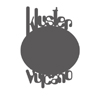 Culled from recordings discovered by member Klaus Freudigmann, this disc represents a crucial bit of evidence in the lesser known manifestation of Kluster. Recorded live in 1971, Vulcano sees the trio of Conrad Schnitzler, Wolfgang Seidel, and the aforementioned Freudigmann engaging in far more experimental electronic excursions than their counterparts, Roedelius and Mobius, would ever delve into.
Culled from recordings discovered by member Klaus Freudigmann, this disc represents a crucial bit of evidence in the lesser known manifestation of Kluster. Recorded live in 1971, Vulcano sees the trio of Conrad Schnitzler, Wolfgang Seidel, and the aforementioned Freudigmann engaging in far more experimental electronic excursions than their counterparts, Roedelius and Mobius, would ever delve into.
The concert is, as near as I can tell, a continuous improvised work, though the label makes the wise choice of splitting the work into 23 short tracks, each of which bleeds into the other effortlessly while still managing to present individual ideas within them. This is clearly a carefully appreciated sonic artifact.
That said, the work's continuous nature allows for the band to take their sound into pockets that fit well in this format; one minute the piece is filled with metallic synth attacks, and the next it submerges into echoing vocals and the hum of telephone wires. While this schizophrenic approach is often disastrous however, Kluster have the curious creativity and improvisational prowess to prevent the work from being crushed under its own weight. With ample space left between most of the proceedings, every sound becomes its own piece as it slides out across the room. The textural richness of each sound is given its due, allowing the whole to remain absorbing and interesting throughout. One can picture the trio hunkered down in wonder as they manipulate their homemade gadgets, only to be met with a sonic environment that appears as exciting to them as to any audience that may have been present.
It is this sense of genuine experimentation that pervades these recordings and makes them so exciting. Light percussive taps appear only to be supplemented by flute meanderings and mumbling synthesizer lines. Swampy decrescendos slip downward into static fuzz. Gentle whispers ride among circuit-bent punctuations before looped vocals decay across barren industrial soundscapes. This sort of brave, even reckless interplay fills the entire performance with strange and intriguing delights that remain unique, even by today's standards.
Perhaps Kluster's strength lies in their distinctly German stance. Far enough removed from the Haight-Ashbury scene, Kluster was able to partake in a musical realm that was open to those working in the relatively flowerless environments that they did without losing any of the social implications of a fully improvised electronic music. Pulling as much from Don Cherry as Karlheinz Stockhausen, the work represents a critical piece of German music at a time when the country was filled with it. That Schnitzler's Kluster remains as overlooked as it does can hopefully be remedied by loving and deserved reissues such as this.
samples:
Read More

